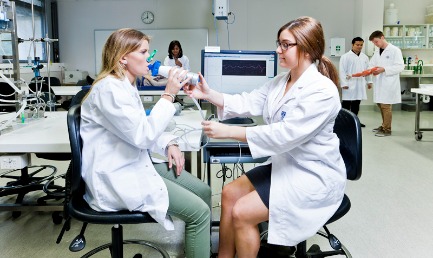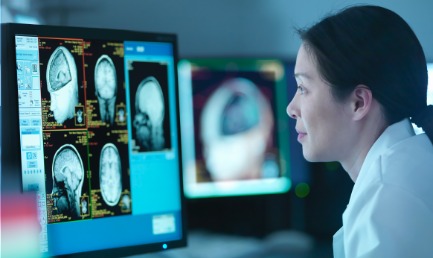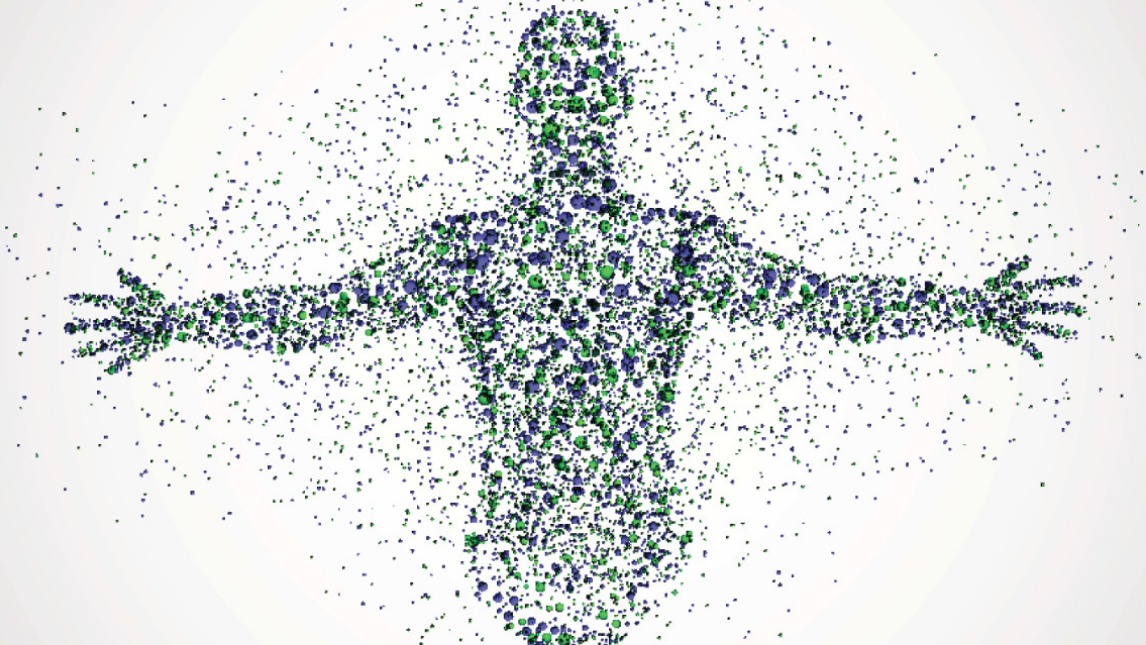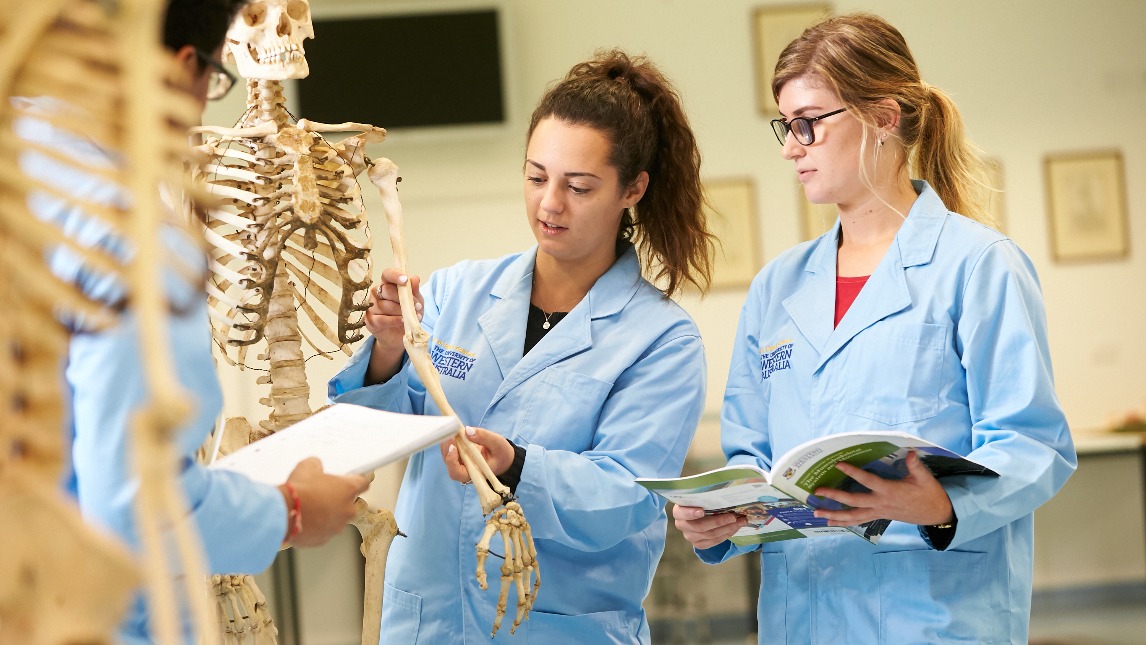School of Human Sciences
Discovering what it is to be human
1st in WA and 3rd in Australia for Anatomy and Physiology (QS 2025)
1st in WA and 5th in Australia for Sports-Related Subjects (QS 2025)
Our teaching and research
Anatomy and human biology
The combined study of the biology and behaviour of human beings with current social and ethical issues
Audiology
The prevention, assessment, and rehabilitation of hearing loss and vestibular (balance) dysfunction
Exercise and health
Discovering how exercise can prolong lifespan and prevent common and debilitating chronic diseases.
Neuroscience
The anatomy, physiology and biochemistry of neuronal function and neuronal circuitry.
Physiology
How the body's cells, tissues and organs interact and the surrounding environment to produce beneficial effects on function
Sport science
Optimising the performance of individual and teams within the professional sports industry
- Anatomy and human biology
-
Find out how to study anatomy and human biology at UWA:
- Anatomy and Human Biology major
- Anatomy and Human Biology honours
- Human Sciences (Anatomy and Physiology) extended major
- Bachelor of Human Sciences and Master of Bioinformatics
Biological anthropology
Biological anthropology investigates how the biology and behaviour of humans are influenced by genetic, developmental, ecological and cultural factors. We focus on evolutionary principles as applied to human evolution, the behavioural ecology of primates, the process of gene-environment interaction during development, and the interplay of cultural and biological factors in human behaviour.Cell and molecular biology
Research in cell biology looks at cellular and molecular networks, and the interactions underpinning human biology. This research helps us understand how our genetic information and signalling networks give rise to distinct cell types, and how our cells respond to environmental challenges, including disease states.Reproductive biology and endocrinology
Research in reproduction examines the impact and interaction of stress and nutritional factors on male and female fertility, placental function, fetal growth, pregnancy outcome and fetal programming of the adult phenotype.
Human studies centre on the use of assisted reproductive technology, particularly psychosocial and lifestyle factors influencing treatment outcome and issues surrounding the use of donated gametes and embryos.Sleep science
Sleep science research explores the causes of, and treatments for, sleep disorders including sleep apnoea and insomnia.
Research is undertaken at the Centre for Sleep Science, the University's purpose-built sleep training and research facility, in collaboration with the West Australian Sleep Disorders Research Institute at Sir Charles Gairdner Hospital. - Audiology
-
Find out how to study audiology at UWA:
Hearing deafness and sensory neuroscience
Deafness is one of the most common sensory deficits. The Auditory Laboratory specialises in research into the physiology of hearing, deafness and tinnitus, and associated aspects of neurophysiology and membrane transport. It is one of Australia's leading research institutions in auditory physiology, and hosts UWA’s Master of Clinical Audiology.Paediatric and Educational Audiology
Hearing loss, middle ear disorders and auditory processing disorder in children are highly prevalent in Australia and globally. Hearing ability is one of the several factors that can influence a child’s learning at school. We specialise in the use machine learning techniques to improve detection of hearing loss and middle ear disorders and developing novel treatments to help children with auditory processing disorder achieve their full potential. The use of tele-health in audiology is also being investigated to provide services to those who may not have regular access to Audiological services. - Exercise and health
-
Find out how to study exercise health at UWA:
- Exercise and Health major
- Sport Science, Exercise and Health honours
- Bachelor of Sport and Exercise Sciences and Master of Clinical Exercise Physiology
- Master of Clinical Exercise Physiology
Lifespan physical activity and health
Our research focuses on modifying behaviours that lead to a healthier lifestyle. Paediatric exercise science is an emerging specialty in this theme, with applied research and community outreach programs complementing best-practice physical activity interventions among adults of all ages. Additional areas of research emphasis include health promotion, exercise psychology, school-based physical activity, exercise during pregnancy, and exercise among older adults.Research strengths
- Clinical exercise physiology
- Exercise benefits for older adults
- Exercise during pregnancy
- Exercise psychology
- Health promotion
- Paediatric exercise science
- School-based physical activity
Prevention and management of chronic diseases
Premature death has been associated with conditions such as coronary heart disease, stroke, diabetes, dementia and various cancers, but 80 per cent of these can be prevented through regular exercise. Our research investigates how appropriate exercise can play an important role in preventing and managing chronic conditions.Research strengths
- Bone and joint
- Cardiovascular
- Clinical exercise physiology
- Metabolic
- Neuromuscular
- Neuroscience
-
Find out how to study neuroscience at UWA:
- Neuroscience major
- Neuroscience honours
- Human Science and Neuroscience extended major
- Bachelor of Human Sciences and Master of Biomedical Science (Neuroscience Specialisation)
- Master of Biomedical Science (Neuroscience Specialisation)
Hearing deafness and sensory neuroscience
Deafness is one of the most common sensory deficits. The Auditory Laboratory specialises in original research into the physiology of hearing, deafness and tinnitus, and associated aspects of neurophysiology and membrane transport. It is one of Australia's leading research institutions in auditory physiology, and hosts UWA’s Master of Clinical Audiology.Neuroscience and neurotherapy
Our research focuses on developing and testing novel therapeutic strategies for the treatment of neurotrauma and neurodegenerative diseases in the central nervous system. Strategies include stem cell and neural tissue transplantation, pharmacotherapy, gene therapy, and the application of biocompatible polymer systems, with an emphasis on protection and repair of the spinal cord and visual system.Spinal Cord Repair Laboratory
The Spinal Cord Repair Laboratory researches a variety of preclinical strategies aimed at repairing the damaged spinal cord, including stem cell transplantation, tissue engineering with self-assembling peptides, inducing plasticity in the brain using gene therapy to promote enhanced repair in the spinal cord, neuroprotective peptides, in vivo reprogramming and non-invasive methods such as infra-red/near infra-red irradiation and transcranial magnetic stimulation. The laboratory is also a core facility to enable collaboration with other neurotrauma researchers who aim to transfer their own promising regenerative therapies into a spinal cord setting.Our research specialises in the following areas:
- Stem cell transplantation
- Tissue engineering
- Gene therapy
- Neuroprotection
- Non-invasive therapies
- Behavioural testing
- Modulation of the immune system
- Physiology
-
Find out how to study physiology at UWA:
Cardiovascular electrophysiology
The Cardiovascular Electrophysiology Laboratory specialises in research into the mechanisms leading to sudden cardiac death in the young due to genetic mutations in the heart muscle and coronary artery disease that leads to heart attack.Neonatal physiology
Preterm birth is a serious neonatal disorder causing death and long-term ill health for surviving infants. This multidisciplinary research program strives to understand and reduce the morbidity associated with preterm birth.Respiratory physiology
This research program examines the underlying mechanisms of common obstructive airway diseases reducing the quality of life and life expectancy. The tracheobronchial tree is a physiological piping system that supplies the alveoli where gas exchange occurs with the pulmonary circulation. Airway passages are susceptible to disease processes which present early, for example asthma, and later in life, such as chronic obstructive pulmonary disease.Skeletal muscle physiology
Skeletal muscles are essential for all aspects of movement as well as heat generation and metabolism. Our research looks at the physiology of skeletal muscle under healthy, aged and diseased conditions. We are particularly interested in the molecular processes underlying muscle contraction, the mechanisms of contractile dysfunction associated with injury and ageing, and the evaluation of medical treatments for sarcopenia and muscular diseases, such as Duchenne muscular dystrophy.Thermal and comparative physiology
The Thermal and Comparative Physiology Laboratory specialises in research into the mechanisms and ecological consequences of temperature regulation and the physiological adaptation of birds and mammals, including humans, to different environments. Our research has implications for native animal conservation, production animal systems, and the ability of humans to maintain active lifestyles. - Sport science
-
Find out how to study sport science at UWA:
- Sport Science, Exercise and Health extended major
- Sport Science
- Sport Science, Exercise and Health honours
- Bachelor of Human Sciences and Master of Applied Human Performance Science
- Master of Applied Human Performance Science
High performance in sport and industry
This interdisciplinary area involves research activity for over five decades, related to maximising human performance at the highest level in sporting and industry settings. We focus on practical outcomes and producing high-quality, applied research, relevant to both athletic and industry-based situations.We draw expertise from several sub-disciplines including:
- Sports physiology and nutrition
- Sports biomechanics and motor learning
- Applied sports psychology
- Sports medicine and injury prevention
Our key research strengths include:
- Athletic performance optimisation
- Injury prevention and rehabilitation
- Technology and innovation
- Safe and productive workplaces
Principles and mechanisms of movement
This research focuses on understanding the fundamental physiological, molecular, psychological and neuromusculoskeletal principles and mechanisms of biological systems and human movement and activity. We use basic science to develop and improve best practice methods, experimental procedures and computational models. Through a multidisciplinary approach, we create empirical foundations to best inform applied and clinical research.Our key research strengths include:
- Neuromusculoskeletal modelling and simulation
- Macro and molecular comparative biology
- Cardiovascular biology
- Psychometrics
Research partners
The School of Human Sciences collaborates with several partners across industry.

Study with us
Our science graduates are in demand worldwide with job opportunities across a range of sectors. We offer a large variety of flexible and industry relevant undergraduate courses under the Bachelor of Science, including anatomy and human biology, exercise and health, neuroscience, physiology, and sport science. Under the guidance of globally acknowledged faculty, our honours students tackle complex biological issues, contributing to subject expertise and developing technical, written and verbal skills.

Honours and Masters
Want to stand out from the crowd? A honours and masters degree introduces you to the world of research through an independent project in combination with advanced coursework. It will develop your critical analysis and problem solving skills and equip you with the ability to plan, implement and communicate your work to audience.
Honours
For honours and master’s research projects download the full list and application form below:
- School of Human Sciences Student Research Projects 2026
- School of Human Sciences Honours Project Application Form
Scholarships
UWA offers many scholarships that enable our students to successfully complete their course by improving their financial situation. The Frank Pyke Memorial Scholarship and the Dr Margaret Loman-Hall Scholarship are offered for prospective honours students in the School of Human Sciences.
News
Stay updated on the latest news, cutting-edge research and insightful expertise. Whether you're a prospective student or current student, our Seekers Space offers a dedicated platform filled with inspiring stories, valuable information, and practical tips and tools to enrich your educational journey.

Centres and groups
- BioZone
-
BioZone researchers use a transdisciplinary approach to biomedical research to solve complex challenges, leading to improved patient care.
- Cardiovascular Research Group
-
Our laboratory is an international leader in the development and optimisation of peripheral and cerebral vascular function assessment in humans.
As well as focusing on the function and structure of large arteries (i.e. macrovasculature), we have developed techniques to assess microvascular function and structure in vivo.
Find out more - Cell and Molecular Life Facility
-
The Cell and Molecular Life Facility offers state-of-the-art technology to staff and students whose research investigates diverse insults affecting animal and human cells and tissues. Understanding how cells respond to diverse insults at the molecular level, helps to develop alternative and advanced therapeutic methods integrating latest technology.
- Centre for Sleep Science
-
Research conducted at the Centre for Sleep Science at The University of Western Australia aims to identify the causes of, and investigate therapies for, poor sleep.
The Centre for Sleep Science has five bedrooms with state-of-the-art sleep recording and analysis equipment for laboratory-based research sleep studies. The Centre for Sleep Science is the base for a number of postgraduate sleep training courses offered through the University.
- Exercise and Performance Centre
-
The UWA Exercise and Performance Centre (EPC) is an integrated centre offering exercise and health services using evidence-based, progressive and client centre approaches. Our aim is to promote the restoration of function or optimisation of performance in clients ranging from the general public through to elite or developing athletes and industry.
- Histology
-
UWA’s Histology Laboratory produces high-quality work for teaching and research purposes within UWA departments and the general scientific community. It provides a wide range of cutting-edge services, including light and electron microscopy processing and cryostat sectioning.
- Imaging @ Science
-
Our Biological Imaging Lab acquires high-resolution images and videos specialising in optical microscopy, including bright field, fluorescent and confocal microscopy to image live and fixed samples.
The lab has cutting-edge inverted and upright microscopes which support Hoffman, phase, Nomarski and fluorescent microscopy, and a wide range of conventional, digital and low-light cameras and scanners are also available.
- Psychology of Active, Healthy Living Group (PAHL)
-
The UWA Psychology of Active, Healthy Living (PAHL) Group was formed in 2013 by Dr Ben Jackson and Dr James Dimmock. Ben and James now act as co-Directors of the PAHL group, working with collaborators from all over the world and coordinating over a dozen graduate students based at UWA.
The guiding principle of the PAHL group is to develop rigorous, innovative, and fundable projects that make a difference to people’s lives.
The three main objectives of the group are to:
- Conduct basic (e.g., experimental) work that advances our understanding of health and physical activity
- Develop and implement sustainable and effective health promotion interventions
- Translate our research by ensuring the group’s work reaches and involves the community

Body Donation Program
You can donate your body for medical research through body donation, a program run by the School of Human Sciences at UWA. Your donation allows medical students to study real human bodies, a vital educational step in the process to becoming a professional doctor or other health professional.
Locations
The School of Human Sciences are located across UWA's Perth Campus:.

